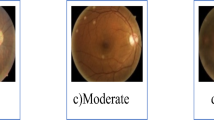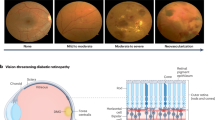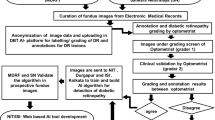Abstract
Introduction
The ORNATE India project is funded by the UK Research and Innovation (UKRI) through the Global Challenges Research Fund. The aim is to build research capacity and capability in India and the UK to tackle global burden of diabetes-related visual impairment. As there are over 77 million people with diabetes in India, it is challenging to screen every person with diabetes annually for sight-threatening diabetic retinopathy (DR). Therefore, alternate safe approaches need to be developed so that those at-risk of visual impairment due to DR is identified promptly and treated.
Methods
The project team utilised diverse global health strategies and research methods to co-design work packages to build research capacity and capability to ensure effective, affordable and efficient DR services are made available for the population. The strategies and methods employed included health system strengthening; implementation science; establishing care pathways; co-designing collaborative studies on affordable technologies, developing quality standards and guidelines to decrease variations in care; economic analysis; risk modelling and stratification. Five integrated work packages have been developed to deal with all aspects of DR care. These included implementation of a DR screening programme in the public health system in a district in Kerala, evaluating regional prevalence of diabetes and DR and assessing ideal tests for holistic screening for diabetes and its complications in 20 areas in India, utilising artificial intelligence on retinal images to facilitate DR screening, exploring biomarker and biosensor research to detect people at risk of diabetes complications, estimating cost of blindness in India and risk modelling to develop risk-based screening models for diabetes and its complications. A large collaborative network will be formed to propagate research, promote shared learning and bilateral exchanges between high- and middle-income countries to tackle diabetes-related blindness.
Similar content being viewed by others
Log in or create a free account to read this content
Gain free access to this article, as well as selected content from this journal and more on nature.com
or
References
World Health Organization. World health statistics 2016: monitoring health for the SDGs, sustainable development goal. Geneva: World Health Organization; 2019.
India State-Level Disease Burden Initiative Diabetes Collaborators. The increasing burden of diabetes and variations among the states of India: the Global Burden of Disease Study 1990–2016. Lancet Glob Health. 2018;6:e1352–62.
Anjana RM, Deepa M, Pradeepa R, Mahanta J, Narain K, et al. ICMR–INDIAB Collaborative Study Group. Prevalence of diabetes and prediabetes in 15 states of India: results from the ICMR-INDIAB population-based cross-sectional study. Lancet Diabetes Endocrinol. 2017;5:585–96.
IDF Diabetes Atlas, 9th ed. 2019. https://www.diabetesatlas.org/en/.
Manley SE, Hikin LJ, Round RA, Manning PW, Luzio SD, et al. Comparison of IFCC-calibrated HbA1c from laboratory and point of care testing systems. Diabetes Res Clin Pract. 2014;105:364–72.
Mohan V, Anbalagan VP. Expanding role of the Madras Diabetes Research Foundation—Indian Diabetes Risk Score in clinical practice. Indian J Endocrinol Metab. 2013;17:31–6.
Bourne RRA, Flaxman SR, Braithwaite T, Cicinelli MV, Das A, Jonas JB, Vision Loss Expert Group. et al. Magnitude, temporal trends, and projections of the global prevalence of blindness and distance and near vision impairment: a systematic review and meta-analysis. Lancet Glob Health. 2017;5:e888–97.
Raman R, Gella L, Srinivasan S, Sharma T. Diabetic retinopathy: an epidemic at home and around the world. Indian J Ophthalmol. 2016;64:69–75.
Shukla R, Gudlavalleti MV, Bandyopadhyay S, Anchala R, Gudlavalleti AS, Jotheeswaran AT, et al. Perception of care and barriers to treatment in individuals with diabetic retinopathy in India: 11-city 9-state study. Indian J Endocr Metab. 2016;20 Suppl 1:33–41.
Sivaprasad S. Tackling diabetic retinopathy from the grassroots. Indian J Ophthalmol. 2020;68 Suppl 1:S8–S9.
Scanlon PH. The English National Screening Programme for diabetic retinopathy 2003-2016. Acta Diabetol. 2017;54:515–25.
Diabetic retinopathy guidelines. 2012. http://www.rcophth.ac.uk. Accessed 16 Feb 2020.
Liew G, Michaelides M, Bunce C. A comparison of the causes of blindness certifications in England and Wales in working age adults (16-64 years), 1999–2000 with 2009–2010. BMJ Open. 2014;4:e004015.
Scanlon PH, Aldington SJ, Leal J, Luengo-Fernandez R, Oke J, Sivaprasad S, Gazis A, Stratton IM. Development of a cost-effectiveness model for optimisation of the screening interval in diabetic retinopathy screening. Health Technol Assess. 2015;19:1–116.
Natarajan S, Jain A, Krishnan R, Rogye A, Sivaprasad S. Diagnostic accuracy of community-based retinopathy screening with an offline artificial intelligence system on a smartphone. JAMA Ophthalmol. 2019;137:1182–88.
Das T, Pappuru RR. Telemedicine in diabetic retinopathy: access to rural India. Indian J Ophthalmol. 2016;64:84–86.
Acknowledgements
The ORNATE India project is funded by the GCRF UKRI (MR/P207881/1). The research is supported by the NIHR Biomedical Research Centre at Moorfields Eye Hospital NHS Foundation Trust and UCL Institute of Ophthalmology.
The ORNATE India Project Group
Pramod Bhende13, Padmaja K. Rani14, Rupak Roy15, Supita Das15, V. Narendran16, George Manayath16, Giridhar Anantharaman17, Mahesh Gopalakrishnan17, Sundaram Natarajan18, Radhika Krishnan18, Sheena Liz Mani19, Manisha Agarwal20, Tapas Padhi21, Umesh Behera21, Harsha Bhattacharjee22, Manabjyoti Barman22, Gajendra Chawla23, Alok Sen24, Moneesh Saxena25, Asim K. Sil26, Subhratanu Chakabarty26, Thomas Cherian27, Reesha KR27, Rushikesh Naigaonkar28, Abishek Desai28, Col Madan Deshpande29, Sucheta Kulkarni29
Author information
Authors and Affiliations
Consortia
Corresponding author
Ethics declarations
Conflict of interest
The authors declare that they have no conflict of interest.
Additional information
Publisher’s note Springer Nature remains neutral with regard to jurisdictional claims in published maps and institutional affiliations.
Members of the ORNATE India Project Group are listed below Acknowledgements.
Rights and permissions
About this article
Cite this article
Sivaprasad, S., Raman, R., Conroy, D. et al. The ORNATE India Project: United Kingdom–India Research Collaboration to tackle visual impairment due to diabetic retinopathy. Eye 34, 1279–1286 (2020). https://doi.org/10.1038/s41433-020-0854-8
Received:
Revised:
Accepted:
Published:
Version of record:
Issue date:
DOI: https://doi.org/10.1038/s41433-020-0854-8
This article is cited by
-
Costs and cost-effectiveness of the Kerala pilot screening programme for diabetic retinopathy in the public health system
Eye (2024)
-
Review of retinal cameras for global coverage of diabetic retinopathy screening
Eye (2021)
-
Deep learning for gradability classification of handheld, non-mydriatic retinal images
Scientific Reports (2021)



